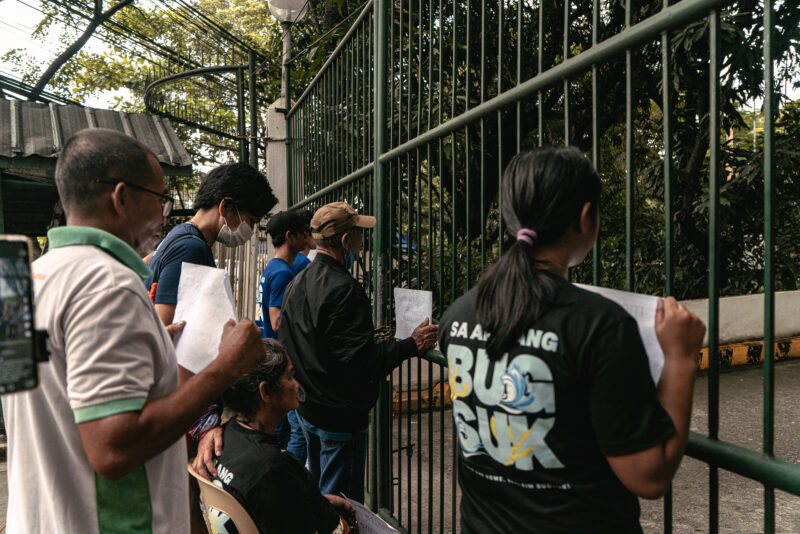When the imported book tax was lifted, book lovers all over heaved a collective sigh of relief. They show us just how important the issue was—especially to their book-loving community.
Junior Rage Arceo has been waiting for the book The Demon’s Lexicon, the first of three installments from author and blogger Sarah Rees Brennan, for months now. To buy books like The Demon’s Lexicon, she saves as much of her allowance as possible.
A few weeks ago, however, something threatened to make her wait longer, and harder—a tax on book imports levied by the Bureau of Customs.
For the love of books
Rage says she would probably do anything for a book. When the P2,000 hardbound collection of short stories entitled Fragile Things came out, she asked her mom to charge it on a card. Rage did odd jobs to pay her back. “I would babysit for three nights or wash the dishes.”
Books are both an inspiration and an escape for Rage. A fan of books on the Holocaust and World War II, she says, “To read something from the point of view of a person who was there… it’s like I’m living vicariously through [their] experiences.”
While fellow book lover Lilia Cornelio, as senior, wouldn’t go to the same extremes as Rage does—“I just ask my parents for extra money if the book is really expensive”—her passion for reading has been instilled since childhood. Combining her mother’s, brother’s, and her own collection, she estimates having around 500 books.
Lilia recalls growing up with Sweet Valley Kids and Nancy Drew books while her brother had Hardy Boys. But her most vivid memory lies with Goosebumps. “Me and my friend were really into this monster ghost thing so we formed a club,” she says. “After playing, we will read by the sandbox then tell scary stories of our own.”
This forged both an active imagination and a wide range of vocabulary. In some way, Lilia says these translated into a semi-writing career. She says, “Sure I used to write—if you call crappy poetry and unfinished stories [as] writing.”
Controversial decision
Rage and Lilia first got word of the book tax, or the “book blockade,” from friends and blogs. “My friends posted links featuring this issue from the Inquirer and the McSweeney website,” says Lilia.
Bloggers including Inquirer columnist Manuel Quezon III said that Customs re-interpreted clauses in several laws, one of them RA 8047—the Book Publishing Industry Development Act. Customs officials said only books used in book publishing were exempted from the tax.
Another re-interpretation involved an international policy, the United Nations Florence Agreement. While it states that educational, scientific, and cultural materials must be tax-free, Customs officials claimed this did not include novels and other reading materials.
The definition of what is educational, and what isn’t, was readily contested. “Will [Customs] be able to tell which books are educational and which aren’t?” asks Filipino professor Allan Derain.
“The Bureau of Customs isn’t the Department of Education. You can’t say something is educational without also saying that some things aren’t. You can’t choose what you learn from,” Rage adds.
The United Nations Educational, Scientific, and Cultural Organization (Unesco) thus expressed its objections to the tax. “The Philippines must respect the Florence Agreement,” John Donaldson, a senior legal officer from Unesco, had said in a statement.
Bibliophiles took the cause to the Internet through blogs. A Facebook group with over 21,000 members called “Filipinos Against The Taxation of Books By Customs” posted regular news updates and petitions opposing the tax.
Placating the reading public
While Derain understands the rationale behind the tax, he is of two minds about its intended effects on the reading public.
“They say that the tax will boost the local publishing industry, because locally-published books will now be read more,” he says in Filipino. “But if people can’t buy imported books, they might just not read altogether.”
Even though she could afford to buy books with taxes that go up to 5%–as what Customs and the Department of Finance of Finance had mandated—Lilia was more worried for other readers. “Whatever effect it might have on me isn’t as much as those who could ill-afford to buy new, and good books,” she says. “Book lovers are not the only ones who are affected by this. We do not even make up half the equation.”
English Professor Nanette Fernandez, however, plays devil’s advocate in this case. “It was supposed to be anti-poor but let’s face it, the poor don’t buy books,” she says. “They have more basic needs to address rather than books.”
Fernandez, who is also the director of Ateneo Center for English Language Teaching, adds that readers have another option to turn to—secondhand bookstores. “It will help entrepreneurs and [it will] be earth-friendly to donate and reuse books that we already have.”
As a back-up plan for when the tax takes effect, Rage has contacted friends and family from abroad who are willing to buy her a copy of The Demon’s Lexicon. “I was afraid that the tax and the delay would continue for years.”
The good news
On May 25th, a significant voice finally spoke for readers. President Gloria Macapagal-Arroyo ordered the tax lifted, saying she wanted books to be within reach for the common man.
Since the law was scrapped, Lilia is both thankful for its quiet resolution, and because she can continue with her dream of starting her own library for her community.
“The duration I read [books] is like a relationship. It’s unforgettable to forge a relationship—except maybe for books that shouldn’t have been written, like Twilight,” she says, poking fun at the book that instigated the tax.
Rage embraced the news with immense relief. “Just imagine if it extended to two years, kids who would have started reading at this age would have gotten certain imported books like two months or years after. That’s a big effect.”
She smiles as she digs into a scrumptious meal at the cafeteria. Her friends have noticed that she’s happier than ever. And why not? The release date on her planner is creeping closer. Best of all, she’s sure to get a copy of her book on time, and without the dreaded tax.
With reports from Desiree T. Tan






